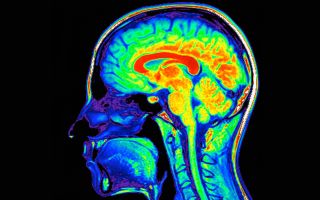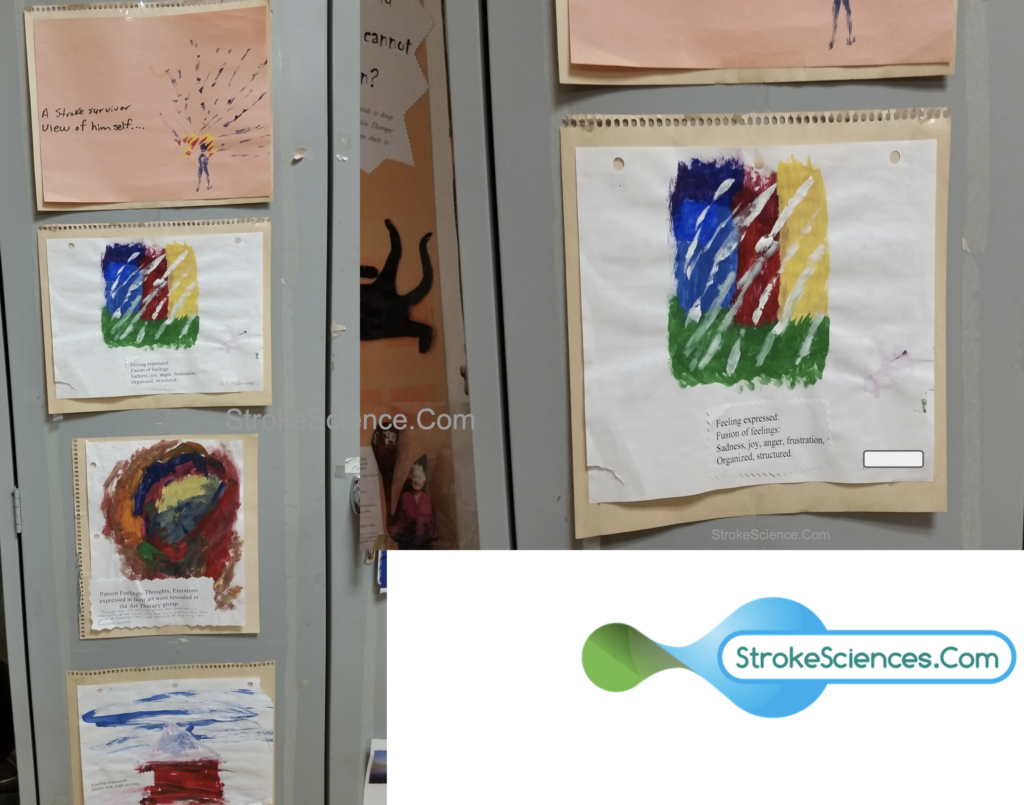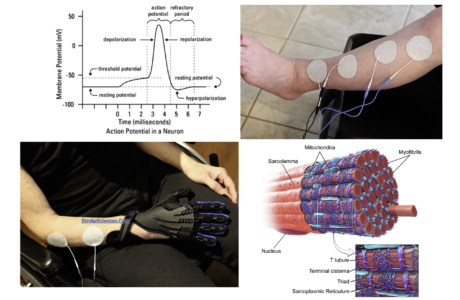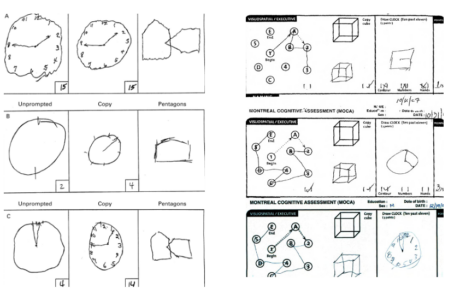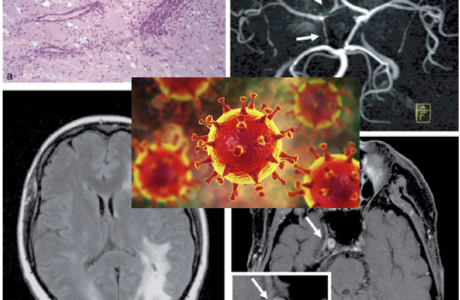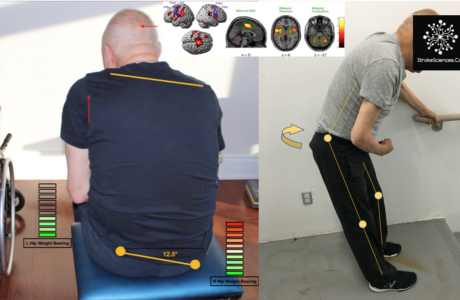A few years back, I was on my way to see a patient on the stroke unit. As I stood at the nursing station to talk to the patient’s nurse, I could not help but to notice a group of patients sitting around a table and painting. For some reason that piqued my curiosity. I walked in the room, and asked the recreational therapist and the patients if I could join them for a couple of minutes and observe what they were painting, and they graciously agreed.
The recreational therapist explained to me that the patients are given a theme; “to paint their emotions” and how they feel after stroke. A couple of days later as I went by the same room again I noticed that they had put the paintings up on the wall and after asking for permission I snapped a few photos which I am going to share with you here. To this day I am not sure why the paintings influenced me so much, but it was striking to me, that up to that day I had not stopped for a second to think what these patients are going through, and how they feel about this drastic change in their lives. It made me think about how we present scientific facts, and prognosis to these patients; a 5-minute conversation. I often wonder now, about the emotional toll of stroke, and how do these patients feel about everything that have happened in their lives after stroke. How are they coping?
A few months ago, as I was going through my photos on my phone, I came across the pictures I had taken years ago of those paintings. On the same day, coincidentally I had the pleasure of seeing one of the most courageous stroke patients of mine and I decided to ask her if she is willing to write a few sentences on how she feels after stroke. At first she was hesitant and explained to me that her first language is Russian and she does not feel comfortable writing in English, but she graciously wrote a few sentences for me and even translated her words into Russian and Hebrew as well, and gave me the permission to share it here. We both agreed not to edit her words and keep them as they came to the paper. Thank you so much Mrs.F. You are an inspiration. I am touched and cannot thank you enough for teaching me and many other clinicians about things that are not found in textbooks.
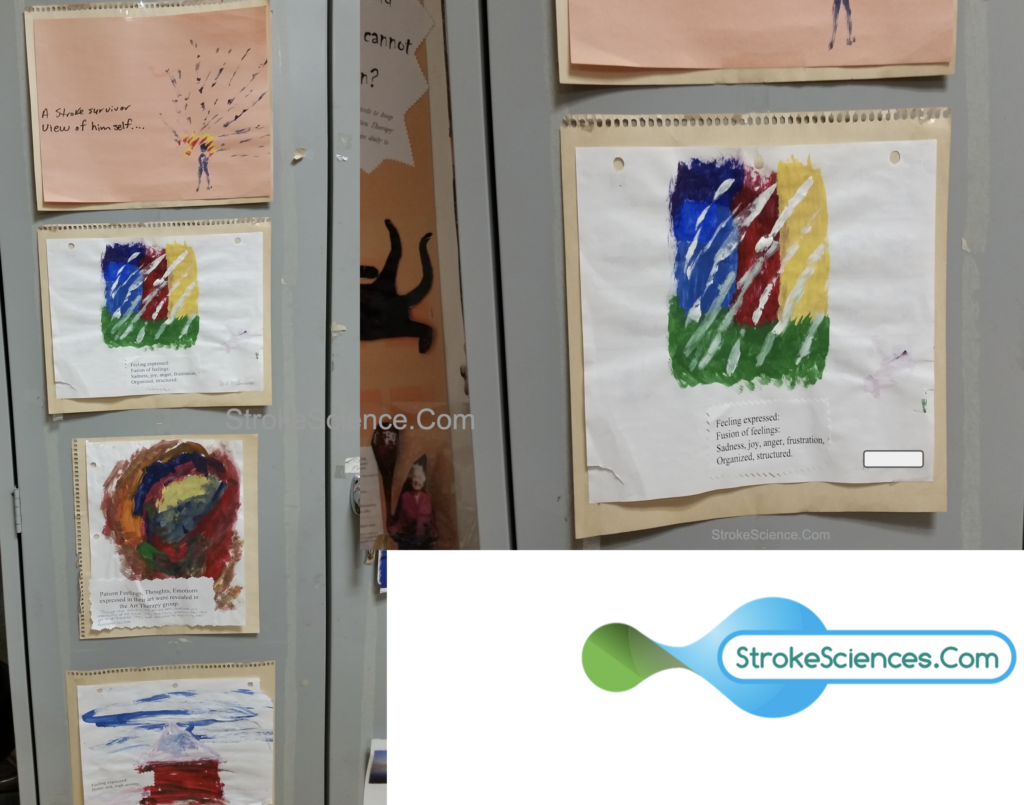
Before reading Mrs.F’s story, I would like to add a brief background on her stroke, prior to stroke Mrs.F was a healthy and active woman with no past medical history. She unfortunately suffered a hemorrhagic stroke at work, which started with a thunderclap headache and loss of consciousness. She was then transferred to a hospital for neurosurgical care and in order to relieve the pressure caused by excessive bleeding and swelling in the brain a craniectomy was performed, and subsequently she was transferred to a stroke unit where she began her rehabilitation.
Mrs.F’s Story:
I was a happy person leading a healthy lifestyle. Two weeks prior to my stroke, I finally found a job.
Six years ago I was sitting in a meeting, when I suddenly felt as if someone had put a gun barrel at my right temple and shot, from unbearable pain in my right temple I began to lose consciousness and slowly roll off the chair. I woke up already in a hospital bed with a bandaged head and tubes hanging out of my head, and around my bed stood my relatives with a worried look. They told me that I had a major stroke. I was in bed and was only able to listen to them, but not answer.Nurses periodically turned me from back to side I guess to avoid bedsores.
After a couple of weeks, I was transported to another hospital for rehabilitation, where they began to put me in a wheelchair, and a few days later I was taken to the first physiotherapy session. But only then I realized how serious my condition was! I was shocked by the fact that I was not able to perform even ebasic movements. I realized that not only did I not feel the left part of the body, but my left side of the body was completely paralyzed.
I stopped sleeping at night, my thoughts haunted me. I did not understand how a healthy, young and active woman turned to be disabled. I was preoccupied by thoughts of such misfortune. I refused to realize what had happened.
Fear from the uncertain future prevailed over me, I had no idea how I would live in such “defect” conditions and thought that my life was over at 42. It was scary, I cried into the pillow at night, so that no one could hear me crying, and during the day I laughed without reason and with reason, just not to think about my grief and thereby drown my fear.
In the third month after the stroke, I began to refuse diapers and asked the nurses to take me to the restroom, which they did not agree initially, as physically I was not ready yet. After 4 months, I was discharged for home rehabilitation in a wheelchair and gained 30 kg. Home rehabilitation was an additional stress for me. My relatives needed to be with me 24 hours a day, in order to serve me in literally every possible way. It took me 2 years of regular sessions with a physiotherapist, while I learned to move around the house with cane and self-care on my own. I have been on regular rehabilitation for 6 years, which includes massage, acupuncture and physiotherapy. Thanks to sessions with my physiotherapist, help from family, and of course my efforts. I am slowly learning how to adapt to life. However, it was not enough for me. I was very sad to realize that I will forever have to forget about my hobby (design and sew clothes).
After all the improvements, the doctors said that “this is a miracle!”, and from the very beginning they did not give me a chance to succeed, as in their opinion I should not have moved, and I heard “this is a miracle” for every little step I took to recovery.
Today, I am fully aware of my abilities and do not have illusions regarding my full recovery, as I initially had. I learned to dress with one hand, serve myself, and even learned how to cook light meals for myself and my family. I also learned not to pay attention to the hollow in my right temple (a portion of my skull was removed to relive the pressure on the day of stroke), but it is important for me that my disability does not catch the eye of strangers, so I try to always look beautiful, clean, tidy as before I became disable, therefore, I found a style suitable for my clothes and updated my wardrobe.
Despite all unbelievable achievements, I want to be completely independent and lead a full and independent life, so overcoming difficulties and pain, I continue to work my rehab team, with whom I achieved a “miracle”. I continue to look for new ways and paths to desirable future.
It would be wrong to say that I am full of optimism and look with confidence into the future. I try not to make long-term plans, and rejoice at the minimum progress with the fragile hope of gaining maximum recovery.
Mrs.F’s words in Russian and Hebrew:
Две недели назад я наконец устроилась на работу по профессии. Это был мой обычный, рабочий день за последние две недели.
6 лет назад, я сидела на собрании, когда вдруг почувствовала, как будто кто-то приставил к моему правому виску дуло пистолета и стрельнул , от невыносимой боли в правом виску я стала терять сознание и потихоньку скатываться со стула. Очнулась я уже на больничной койке с забинтованной головой и трубками из нее, а вокруг моей кровати стояли мои родные с обеспокоенным видом. Они мне рассказали ,что у меня был инсульт с кровоизлиянием в мозг. Я лежала и была в состоянии только их слушать , но не отвечать, периодически меня поворачивали со спины на бок и обратно. Через пару недель меня транспортировали в другую больницу для реабилитации , там меня стали сажать в инвалидное кресло,а еще через несколько дней меня повезли на первую физиотерапию. Вот только тогда, я поняла насколько серьезно мое состояние! Я была шокирована от того, что не была способна выполнить элементарного движения ( опустить левую руку с палки).от сознания того , что я не только не чувствую левую часть тела, как я думала до этого момента, а моя левая сторона тела полностью парализована , я перестала спать по ночам, мысли не давали мне покоя. Я не понимала ,как со мной здоровой, молодой и спортсменкой в прошлом, могло произойти такое несчастье, я отказывалась осознавать произошедшее . Страх перед будущим меня одолевал,я не имела представления как я буду жить дальше и думала, что моя жизнь закончена в 42 года. Было страшно, по ночам плакала в подушку , так чтоб никто не слышал моего плача, а в течение дня я смеялась без повода и с поводом, лишь бы не думать о своем горе и заглушить тем самым свой страх. На третий месяц после инсульта , я стала отказываться от памперсов и, попросила медсестер отвозить меня в уборную , на что они согласились не сразу так, как физически я была еще не готова . Через 4 месяца я была выписана на домашнюю реабилитацию в инвалидном кресле и набравшая лишнего веса в 30 кг. Домашняя реабилитация оказалось дополнительным стрессом для меня. Со мной должны были находится мои родные 24 часа в сутки , для того чтоб обслуживать меня буквально во всем Мне потребовалось 2 года регулярных занятий с физиотерапевтом, пока я научилась самостоятельно с тросточкой передвигаться по дому и самообслуживанию. Я уже 6 лет нахожусь на регулярной реабилитации, в которую входят массаж, иглоукалывание и физиотерапия. Мне с трудом приходится адаптироваться к жизни. Благодаря занятиям с моим физиотерапевтом ,помощи родных и конечно же моим усилиям , я потихоньку адаптируюсь к жизни , но этого не достаточно для меня. Мне очень грустно осознавать ,что мне навсегда придется забыть о своем хобби ( создавать и шить одежду).На все мои успехи к выздоровлению , врачи говорят, что это «Чудо», и с самого начала не давали мне шанса на успех так, как по их мнению я не должна была передвигаться и на каждый мой маленький шаг к оздоровлению слышу:«это чудо!». На сегодняшний день я полностью осознаю свои возможности и не питаю иллюзий в отношении моего полного выздоровления, как это было изначально. Я научилась одной рукой одеваться, обслуживать себя и даже научилась готовить легкие обеды для себя и своей семьи, но я хочу быть полностью независима и вести полноценную жизнь, поэтому преодолевая трудности и боли продолжаю заниматься с моим физиотерапевтом,с помощью которого я достигла «чуда», и я продолжаю искать новые способы и дороги к адаптации. Так же я научилась, не обращать внимания на впадину в моем правом виске, но мне важно, чтоб моя инвалидность не бросалась в глаза посторонним людям, поэтому стараюсь всегда выглядеть красиво, чисто и опрятно как и до инвалидности., поэтому я нашла подходящий для меня стиль одежды и обновила свой гардероб. Было бы неверно сказать, что я полна оптимизма и смотрю с уверенностью в будущие. Я стараюсь не делать долгосрочных планов , и радоваться минимальному прогрессу с хрупкой надеждой на приобретение максимального выздоровления.
הייתי אדם מאוד חיובי עם אורח חיים בריא ומלא אושר, כלפני שבועיים, סוף כל סוף קיבלתי הצעת עבודה.
באחד מן הימים לקראת השבוע השני אחרי התחלת העבודה, לפני 6 שנים בפגישה שנערכה עם הצוות, לפתע חשתי מן תחושה עוינת כאילו מישהו הצמיד אקדח לרקה הימנית שלי וירה. כאב בלתי נסבל בצד הימני של הראש גרם לי לתחושת עילפון וחוסר הכרה ולאט לאט מעדתי מהכיסא
התעוררתי לאחר מכן וכבר בבית החולים עם כיסוי ראש חוטי חשמל וצינורות מחוברים למוח, ומסביבי עומדים ובפנים מודאגות קרוביי ואוהביי. אז הודיעו לי שהיה לי שבץ מוחי והעניין די רציני, כשלהפתעתי הצלחתי רק להקשיב להם, הזזת השפתיים או פעולת הדיבור לא נראו כמשהו שהצלחתי לעשות. מפעם לפעם הם סיבבו אותי מהגב על הצד ובחזרה.
לאחר כמה שבועות העבירו אותי לבית חולים אחר להחלמה והתייצבות, היכן שהתחילו להושיב אותי בכיסא גלגלים לנכים, ולאחר כמה ימים אחרי זה נלקחתי לפיזיוטראפי הראשון שלי ורק אז הבנתי עד כמה חמור מצבי נהפך, הופתעתי לגלה שגם הוראות ותנועות גוף פשוטות לא הצלחתי לבצע, כמו להוריד את יד השמאלית שלי ממקל. אז השוק תקף שוב, לא רק שלא יכולתי להרגיש את כל הצד השמאלי של גופי אלה הוא היה לגמרי משותק.
לא הצלחתי להירדם בלילות רדופה ממחשבות, לא הצלחתי להפנים איך אדם בריא, אקטיבי צעיר ללא כל תופעה בריאותית ידועה נהפך נכה. על כן הייתי רדופה באותן מחשבות של חוסר מזל, עם חוסר רצון או הצלחה להפנים את מה שקרה.
פחד מעתיד לא נודע גרם לחשוב שאין לי מושג איך אחיה במצב “פגום” כזה וכי חיי נגמרו בגיל 42, זה הי מפחיד ומרתיע, בכיתי לכרית בכל לילה. כך שאף אחד לא ישמע אותי בוכה, ובמשך היום הייתי צוחקת ללא סיבה ועם סיבה. כל דבר שעזר למנוע מלטבוע ביגון של עצמי ופחד מעצמי.
בחודש השלישי לשבץ התחלתי לסרב לחיתולים ודרשתי מהאחיות שייקחו אותי לשירותים, בקשה שאינם הסכימו איתה מלכתחילה, מכיוון שפיזית עוד לא הייתי מוכנה לאחר כ-4 חודשים שוחררתי להתייצבות ושיקום ביתי, בכיסא גלגלים ו30 קילו יותר.
השיקום הביתי רק היה עוד גורם עצום של לחץ, קרוביי היו אמורים להשגיח עלי 24 שעות ביממה, בכדי שיוכלו לשרת אותי בכמעט כל דבר. שנתיים שלמות של פיזיו עד שהצלחתי בקושי להתהלך בבית בעזרת מקל ולדאוג לעצמי בדברים בסיסיים. לאחר 6 שנים רצופות של שיקום ביתי, שכלל עיסויים רפואיים, טיפול בדיקור ופיזיותרפיה, כעט בקושי רב הני חייבת להסתגל ל”חיים”.
תודות לפיזיותראפיסט שלי, למשפחה שלי וכמובן למאמצים האישיים שלי, אני סופסוף לומדת להסתגל לחיים, למרות זאת זה לא הרגיש מספיק! לא הצלחתי להשלים עם העובדה שהני צריכה לוותר על התחביב שלי כמו עיצוב הרכבה ותפירת בגדים.
על כל ההצלחות שלי, הרופאים אומרים “זה נס” למרות שמההתחלה לא הביאו לי אף סיכוי להצלחה, כי מבחינתם לא הייתי אמורה להצליח לזוז יותר- לגמרי. ואני שמעתי “זהו נס” לאור כל הדרך עם כל צעד קטן שלקחתי.
היום אני בהחלט מודעת לכל היכולות שלי ולא משלה את עצמי מעבר למגבלות שלי, למדתי להלביש את עצמי ביד אחת, להגיש לעצמי ואפילו לבשל ארוחות קלות לעצמי ולמשפחה.
למדתי גם לא לשים לב לשקע שיש לי בצד הימני של הראש. עם זאת עדיין תמיד נורא חשוב לי שהסובבים אותי והזרים לי לא ישימו לב למגבלות שלי, אז אני עושה את מירב יכולתי להיראות מסודר, נקי ויפה.
למרות כל הקשיים הצלחתי להתמודד ולהמשיך למצוא דרכים יצירתיות להקל על המצב הנוכחי, כמו כן להמשיך להשתפר ולהטיב עם עצמי והיכולות שלי.
כמו כן איני מתכננת יותר לעתיד הרחוק מדי, ומנסה להיות שמחה בחלקי, עם כל הישג מינימאלי בתקווה להשגת החלמה מקסימלית.
